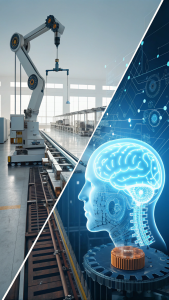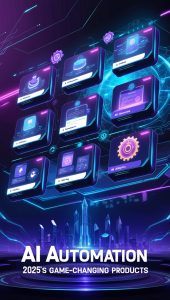AI – Boost Your Business Now

In today’s rapidly evolving business landscape, staying ahead of the curve requires embracing innovative technologies. Artificial Intelligence (AI) is transforming industries, and AI automation services are at the forefront of this revolution. Businesses increasingly need automation to streamline operations, boost efficiency, and gain a competitive edge. This comprehensive guide will explore the world of AI automation services, unveiling their potential to create a smarter, more efficient business.
What are AI Automation Services?
AI automation services represent a significant leap beyond traditional automation. While traditional automation relies on pre-programmed rules to handle repetitive tasks, AI automation leverages the power of intelligent technologies like machine learning, natural language processing, and computer vision. This enables automation to handle more complex, dynamic tasks, adapt to changing conditions, and even learn and improve over time.
Examples of AI automation services include AI-powered chatbots that provide instant customer support, robotic process automation (RPA) that automates back-office tasks, and predictive analytics that forecasts future trends based on data analysis.
Types of AI Automation Services
Business Process Automation
AI revolutionizes business processes by automating repetitive tasks such as invoice processing, data entry, and customer onboarding. This frees up human employees to focus on higher-value activities. For example, an insurance company can use AI to automate claims processing, reducing processing time by 80% and significantly lowering costs.
Marketing Automation
AI empowers marketers to create highly personalized campaigns, generate leads more effectively, and manage social media interactions with greater efficiency. AI-driven marketing tools can analyze customer data to identify patterns and preferences, enabling targeted advertising and personalized content delivery.
Customer Service Automation
AI chatbots and virtual assistants enhance customer experience by providing 24/7 support, answering frequently asked questions, and resolving simple issues without human intervention. AI-powered sentiment analysis can gauge customer emotions, enabling businesses to tailor their responses and improve customer satisfaction.
Sales Automation
AI assists sales teams by automating tasks like lead scoring, sales forecasting, and opportunity management. AI algorithms can analyze customer data to identify high-potential leads, predict sales trends, and recommend optimal sales strategies, ultimately leading to increased sales efficiency and faster deal closures.
IT Automation
AI plays a crucial role in automating IT tasks such as network monitoring, cybersecurity threat detection, and system maintenance. AI-powered systems can identify anomalies, predict potential outages, and automatically take corrective actions, minimizing downtime and improving IT infrastructure management.
Benefits of AI Automation Services
Increased Efficiency and Productivity
AI automation streamlines processes, eliminates bottlenecks, and reduces errors, leading to significant gains in efficiency and productivity. Studies have shown that AI automation can boost productivity by up to 40%.
Cost Reduction
By automating tasks previously performed by humans, businesses can reduce labor costs, optimize resource utilization, and minimize errors, leading to substantial cost savings.
Improved Accuracy and Quality
AI algorithms are designed to perform tasks with high accuracy and consistency, minimizing human error and ensuring consistent quality in outputs.
Enhanced Customer Experience
AI-powered personalization, 24/7 availability, and faster response times contribute to a superior customer experience, fostering customer loyalty and satisfaction.
Data-Driven Insights and Decision Making
AI analytics tools can analyze vast amounts of data to extract valuable insights into business operations, customer behavior, and market trends, empowering businesses to make informed, data-driven decisions.
How to Choose the Right AI Automation Services
Identify your business needs and objectives. Before implementing AI automation, clearly define your specific needs and desired outcomes.
Assess your existing infrastructure and data capabilities. Ensure your current systems and data are compatible with the AI automation solutions you are considering.
Research different AI automation vendors and solutions. Explore the market and compare different vendors based on their expertise, offerings, and pricing.
Consider factors like scalability, security, and integration capabilities. Choose solutions that can scale with your business, ensure data security, and seamlessly integrate with your existing systems.
Start with a pilot project and gradually scale up. Begin with a small-scale implementation to test the effectiveness of the AI automation solution before expanding its use across the organization.
Future of AI Automation Services
The future of AI automation is bright, with emerging trends like hyperautomation and the increasing use of AI in decision-making poised to reshape industries. Hyperautomation integrates multiple AI technologies to automate even more complex processes, while AI-driven decision-making empowers businesses to make better decisions based on data insights. The impact of AI automation on the workforce will likely lead to a shift in job roles, with new roles focused on managing and optimizing AI systems. Ethical considerations in AI development and deployment will be crucial to ensure responsible and beneficial use of this transformative technology.
Conclusion
AI automation services offer a multitude of benefits for businesses seeking to thrive in the digital age. From increased efficiency and cost reduction to enhanced customer experiences and data-driven insights, AI automation is essential for businesses seeking to gain a competitive edge. Embrace the transformative power of AI and explore AI automation solutions to unlock the full potential of your business.
FAQs
What is the difference between AI automation and traditional automation?
Traditional automation follows pre-programmed rules to handle repetitive tasks, while AI automation uses intelligent technologies to handle more complex tasks, adapt to changing conditions, and learn from data.
How much does it cost to implement AI automation services?
The cost varies based on the complexity, scope, and vendor. Factors like infrastructure, data preparation, and customization impact the overall cost. Consider the return on investment (ROI) rather than just the upfront cost.
What are the biggest challenges of implementing AI automation?
Challenges include data quality and availability, integration with existing systems, talent acquisition and skill gaps, change management, and ethical considerations and bias.
What are some examples of successful AI automation implementations?
Examples include chatbots for customer service in e-commerce, predictive maintenance in manufacturing, and fraud detection in finance. These implementations have resulted in improved efficiency, reduced costs, and enhanced customer experiences.
Is AI automation going to replace human jobs?
AI automation will likely shift job roles rather than completely replace them. New roles will focus on managing and optimizing AI systems, emphasizing the collaborative potential of humans and AI working together.


